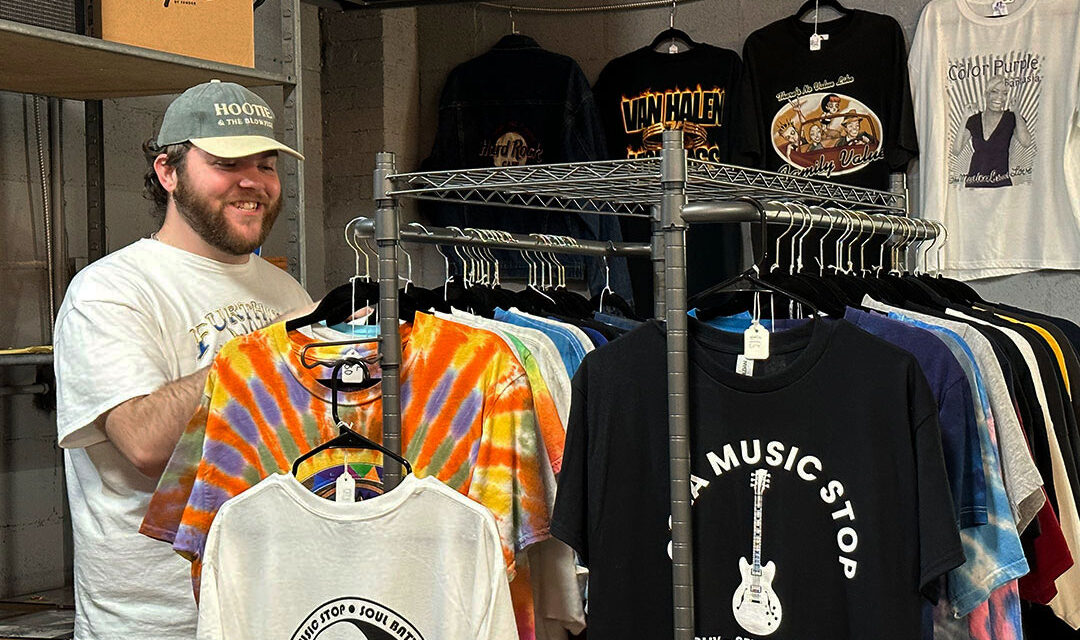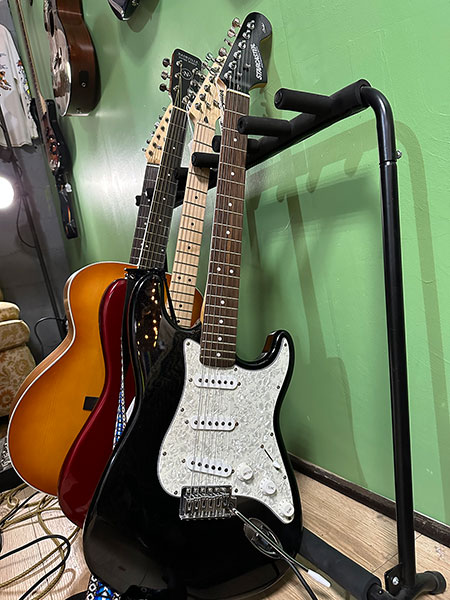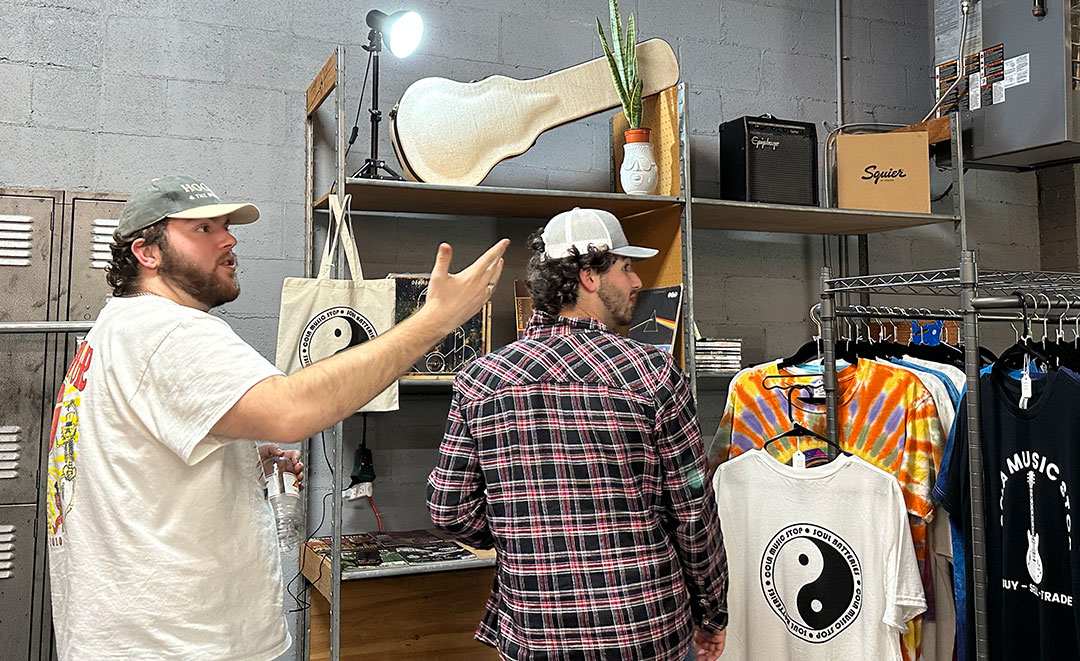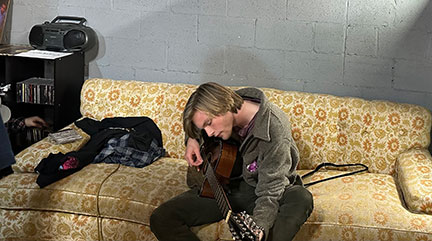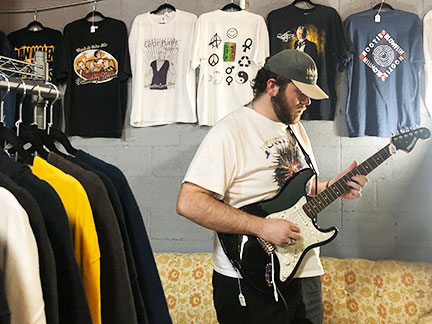Joseph Blake started the Cola Music Stop as a “fun thing to do.” But its location and products might allow it to be more than a hobby. (Photos by Lauren Leibman)
Joseph Blake is a “sidepreneur.”
He’s a senior marketing major at the University of South Carolina and an intern at the Electric Cooperatives of South Carolina during the week.
But on Friday nights from 6 p.m. to 9 p.m., he can be found organizing band T-shirts and playing bass guitar with his customers at the NoMa Flea Market, a co-work art space on Sumter Street. He wears a Hootie and the BlowFish baseball cap and colorful Converse sneakers.
Blake started the Cola Music Stop just last month mostly for fun, selling new and second-hand records, CDs, clothing and music equipment. But the store opened at a time and place that could give it an advantage over other entrepreneurial ventures, said experts at the University of South Carolina’s Faber Entrepreneurship Center.
Blake’s face glows and a smile crinkles the corner of his eyes when he talks to customers about his inventory.
“It doesn’t even feel like work to me,” he said. “It just feels like a fun Friday night.”
As a sidepreneur, Blake operates the store part time when he’s not at his internship or in class. Because the store is in a cooperative space, customers still can shop his booth while he’s gone. But Blake is physically present during NoMa’s weekly Friday market.
Retail startups are making a comeback after the COVID pandemic. And the recent popularity of second-hand clothing and resale markets in general could help sustain Cola Music Stop’s success, said Kasie Whitener of USC’s Faber Center.
Resale markets nationally saw a 58% growth in 2021. That’s the highest increase in five years, according to a thredUP 2022 report.
Resale also ranks as one of the top nine most promising kinds of businesses this year, according to a survey conducted by Insider, a global business and financial publication.
Blake sources most of his inventory from area thrift stores and flea markets. His electronic items, such as music equipment and guitars, usually come from online sellers on Facebook Marketplace.
Buying used items allows Blake to keep prices low for his customers. He’s open to bargaining with shoppers, even if he doesn’t make a big profit.
“I want for everyone, the average person, to be able to buy (from me),” he said.
Blake is originally from Andrews in the Lowcountry. Like a true music lover, the defining detail he shared about the area was that it’s Chubby Checker’s birthplace.
But choosing to start his business while attending school in Columbia could help his store to grow.
Columbia is “a great town to start a business in,” said Joel Stevenson, assistant director of the Faber Center.
Stevenson started USC’s technology incubator in 1999 and has founded and sold four businesses.
“If you want to start a business, you’ve got a whole bunch of friends and economic development partners in the city of Columbia,” Stevenson said.
The city saw an additional effort to support entrepreneurship with the recent opening of The Boyd Foundation Community Innovation Center. The center is run by the nonprofit GrowCo and works to connect local technology startups.
Another Columbia organization, 1 Million Cups, exists to back entrepreneurship. It’s a weekly coffee meet up where entrepreneurs can network and share information about their startups.
Blake has chosen to draw support from the NoMa Warehouse staff, particularly owner Beth Lawson, and from family and friends.
Blake’s brother put up the guitar racks. His grandmother helped pay the first month of rent.
But Blake is still a “solopreneur,” which means he started and runs his business independently. That can be stressful because the pressure to perform well is entirely on him, Blake said.
If he ever needs extra support, there are resources available to him as a USC student, Stevenson and Whitener said.
The Faber Center and USC’s McNair Institute for Entrepreneurism and Free Enterprise offer hands-on, integrative learning opportunities for students as well as business advice.
There is also a strong alumni network of entrepreneurs in Columbia and an effort to create an “entrepreneurial ecosystem,” Whitener said.
Blake isn’t sure what will happen to Cola Music Stop after he graduates.
He would like to run the shop full time but is also considering a job with the Electric Cooperatives of South Carolina if it’s offered.
He plans to operate and grow the store regardless, even if it’s for passion rather than profit.
“It’s all for the good of music,” Blake said.
Lawson, the NoMa Warehouse owner, is hopeful for Blake’s future.
“I think he’s found a lot of success so far,” Lawson said. “I’m just really excited to see him grow and see what’s next for him.”
The Cola Music Stop is a combination of Blake’s favorite things about music. He sells everything from guitars to vinyl records.
Blake said he loves interacting with customers of all ages. He might sell a little kid his first bass guitar and listen to older shoppers reminisce about Pink Floyd concerts in the same night.
Customers, such as Ryan Pellatt, are encouraged to try out the guitars and equipment before they buy.
Blake is a musician himself. He primarily plays bass and guitar but dabbles in piano and drums.

